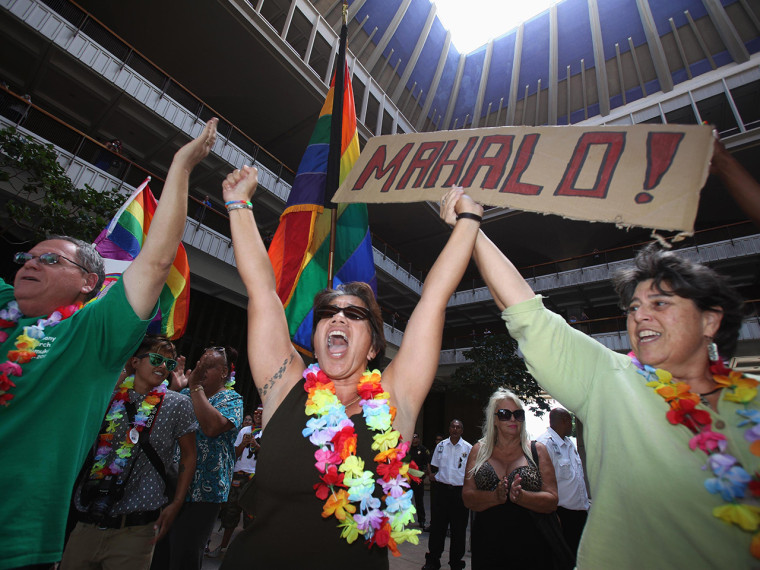Hawaii’s Senate on Tuesday passed same-sex marriage legislation in an historic ballot in one of the first states where gays and lesbians couples sought the right to wed more than 20 years ago.
The bill, approved 19-4, heads to Gov. Neil Abercrombie, a supporter of same-sex marriage who is expected to sign the measure into law on Wednesday, making Hawaii the 15th state to grant gay marriage. Weddings can begin Dec. 2.
Fourteen states plus the District of Columbia allow same-sex marriage. Hawaii’s ballot comes a week after lawmakers in Illinois voted to approve same-sex marriage, but Ill. Gov. Pat Quinn has said he will sign their bill on Nov. 20.
Passage of the Hawaiian bill “marks a pivotal moment in our state’s history, a moment enshrined in equality and justice,” Senate Majority Leader Brickwood Galuteria, who introduced the bill, said in a statement.
The Senate first approved the legislation and then sent it to the House, where the vote was seen as the key ballot.
In a rare move, the House allowed the public to speak during the debate: More than 1,000 people, most of them actually opposed to same-sex marriage, spoke over five days, providing 56 hours of testimony in what some referred to as a public or citizen’s “filibuster.”
Nearly 24,000 written testimonies — evenly split between opponents and supporters — were also submitted.
Most opponents were concerned about religious groups possibly being forced to solemnize or celebrate same-sex marriages.
House lawmakers tacked on exemptions to the bill allowing religious groups and affiliated nonprofits to be exempt from having to provide goods, services or facilities for the solemnization or celebration of same-sex marriages. They will be immune from legal liability, too. The exemptions were modeled after similar language in Connecticut’s gay marriage law.
The Senate accepted those changes.
“Working together with our colleagues in the State House we have come to a compromise which provides a balance between religious freedom and equal rights,” Galuteria said.
The Aloha state was at the forefront of the gay marriage debate back in the early 1990s, when three same-sex couples sued for the right to wed. Though the courts sided with the couples, a voter approved amendment to the state constitution in 1998 mandated that only the legislature could decide who gets to marry, thereby nullifying the court case.
The bid by the Hawaii couples to get married also helped lead to passage of the 1996 Defense of Marriage Act, which didn't allow federal recognition of same-sex marriage. The Supreme Court struck down that part of the law barring such recognition in late June, allowing gay couples across the country to receive more than 1,100 federal benefits they'd previously been denied.
One of the original parties to the Hawaii case, Ninia Baehr, 53, told NBC News on Tuesday after the vote: "There is really a sweet sense of things coming full circle. I love it."
She and the woman she filed the case with, Genora Dancel, have stayed close after their split in 1997.
"I do have a sense of completion or satisfaction, and yet I know that out of 50 states, we don’t even have half of them," Baehr, deputy director of the ACLU in Montana where she has worked to push through domestic partnerships, said of the 33 states that prohibit same-sex marriage. "There’s still a lot of work to be done.”
Are you part of a same-sex couple hoping to get married but living in a state where you cannot do so? Are you part of a same-sex couple not planning to get married? Share your story with reporter Miranda Leitsinger at miranda.leitsinger@nbcuni.com. Also note if your comments can be used and provide a telephone number.
